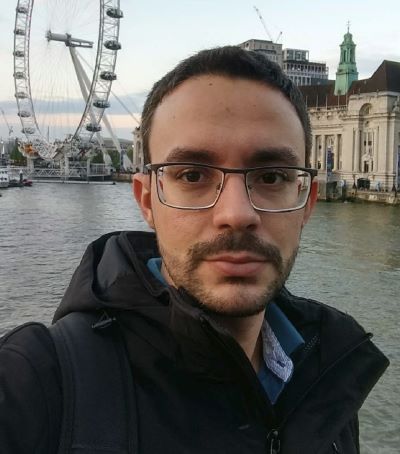Deep-Learning Detection of Aedes aegypti Breeding Grounds Based on Drone Images
The Montreal Chapter of the IEEE Signal Processing Society cordially invites you to attend (in presence) the following talk to be given at McGill University by Ph.D. candidate Wesley L. Passos, from the Federal University of Rio de Janeiro (COPPE/UFRJ).
Date and Time
Location
Hosts
Registration
-
 Add Event to Calendar
Add Event to Calendar
- Contact Event Host
-
Prof. Benoit Champagne, ECE Department, McGill University, Montreal
Co-sponsored by STARaCom
Speakers
 Wesley L. Passos of Federal University of Rio de Janeiro (COPPE/UFRJ).
Wesley L. Passos of Federal University of Rio de Janeiro (COPPE/UFRJ).
Deep-Learning Detection of Aedes aegypti Breeding Grounds Based on Drone Images
Abstract: The mosquito Aedes aegypti is the transmitter of several diseases, such as dengue, zika, and chikungunya. The current best way to combat these diseases is to control and eliminate potential mosquito breeding grounds. The Aedes aegypti reproduces in clean and stagnant water. So, any containers that store water are possible breeding grounds. According to current sanitary regulations, health agents must visit properties to search for and eliminate potential mosquito breeding grounds. However, this approach presents many limitations, including temporal or frequency constraints, safety concerns, and costs. Satellite imagery is not considered a viable alternative due to limited spatial and time resolutions besides its elevated costs. Using unmanned aerial vehicles (UAVs) or drones presents several advantages over traditional methods, including increased safety for auditors, higher spatial and temporal resolution, and minimal operational costs. Therefore, in this presentation, we show the idea of using images and videos captured by a drone to support local health agents in locating potential hazardous sites and using machine learning and computer vision techniques to aid the specialist in localizing relevant mosquito foci.
Biography:
Wesley Lobato Passos was born in Rio de Janeiro, Brazil, in 1991. He received the BSc degree in Control and Automation Engineering from the Federal Center for Technological Education (CEFET/RJ), Rio de Janeiro, Brazil, in 2016, with 14 months at the University of Georgia (UGA), USA (2015) and two months at the Illinois Institute of Technology (IIT), USA (2015). He received a Master’s degree in Electrical Engineering from the Federal University of Rio de Janeiro (COPPE/UFRJ) in 2019. He is pursuing a Doctoral degree in Electrical Engineering at the Federal University of Rio de Janeiro (COPPE/UFRJ). He won the Google Latin America Research Award in 2019 and 2020 for the project on detecting Aedes aegypti mosquito outbreaks using computer vision and machine learning techniques. He has participated in several research and development projects on signal processing and machine learning, especially for oil and gas industry applications. He has experience with aerial images, image and video processing, computer vision, and machine learning.
Email:
Address:Alberto Luiz Coimbra Institute for Graduate Studies and Research in Engineering (COPPE), Federal University of Rio de Janeiro, Brazil

